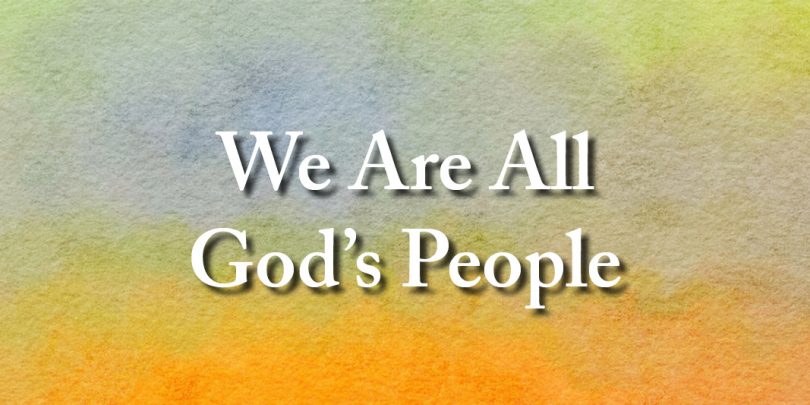Welcome to the RJT Series – First Week of Advent, 2020
First Session “We Are All God’s People”
Sue Koenig
- Introduction (5 min.)
- Welcome to the RJT Series – First Week of Advent, 2020
- First Session “We Are All God’s People”
- Story Sharing The Rev. Mark Breland, Lititz Moravian Church, Lititz, PA
- “My Life Matters” – One Black Man’s Perspective
- Scripture Isaiah 64:1-9 [Isaiah 63:15-64-11]
Review of Handout – Rules for Respectful (Faithful) Conversation
Vocabulary
- Lament – “A passionate expression of grief, often in music, poetry, or song. The grief is often born of regret, or mourning.
- Biblical lament – “A means for God’s people to express pain and suffering; a prayer to God for God’s help and deliverance from distress, suffering, or pain
Opening Prayer and Scripture (5 min.)
O God who opened the heavens at the baptism of your Son, Jesus Christ, open our hearts and minds that we may learn and grow in our understanding of what it means to be your people. Amen.
Read Isaiah 64:1-9
Questions and Reflection (10 min.)
- One commentator, C. Westermann, calls this expanded section of Isaiah, “probably the most powerful psalm of lament in the Bible.” What is communal lament? In what ways do you hear communal lament in the reading from Isaiah?
- Have you experienced a time of communal lament in your congregation? What was the source of the grief or pain?
- What other feelings are expressed in the text?
- What are the people crying out to God to do?
Reflection
In this psalm of communal lament, the people of Israel cry out to God to turn again to face them. They have sinned against God, and God has turned away from them. They confess their disobedience and their sin, acknowledging that God is right to be angry and that their sin has consequences and cannot simply be overlooked. They plead with God to remember that they are all God’s people, the work of God’s hand. In our participation in racial injustice and in our complicity, we have sinned against God and we make our communal lament, acknowledging that the sin of racism has deep and dire consequences causing harm to generations of Black people. We recognize that this sin cannot simply be confessed and lamented, but that we must find ways, by prayer and supplication and action, to bring justice and healing.
The Rev. Mark Breland’s Sermon (Video) (10 min.)
For Week 1: “My LIfe Matters: One Black Man’s Perspective” from IBOC • Mike Riess on Vimeo.
Questions (30 min.)
- Is Rev. Mark Breland’s sermon a lament? In what ways?
- What feelings does Rev. Breland express in his sermon? What feelings did you experience as you listened to Rev. Breland’s sermon?
- Breland mentioned The Rev. Dr. Martin Luther King’s quote and a related film, “A riot is the language of the unheard.” This quote was used numerous times by Dr. King and may be found in his 1967 speech at Stanford, “The Other America.”
…I think America must see that riots do not develop out of thin air. Certain conditions continue to exist in our society which must be condemned as vigorously as we condemn riots. But in the final analysis, a riot is the language of the unheard. And what is it that America has failed to hear? It has failed to hear that the plight of the Negro poor has worsened over the last few years. It has failed to hear that the promises of freedom and justice have not been met. And it has failed to hear that large segments of white society are more concerned about tranquility and the status quo than about justice, equality, and humanity. And so in a real sense our nation’s summers of riots are caused by our nation’s winters of delay. And as long as America postpones justice, we stand in the position of having these recurrences of violence and riots over and over again. Social justice and progress are the absolute guarantors of riot prevention.
In what ways have we continued to fail to hear over the past 53 years? Are non-violent protests and riots both forms of lament? Why or why not?
- What are ways that we show we value the lives of others?
- Rev. Breland said that if the congregation values his life and the life of his wife and children, they will also affirm that Black lives matter. How do you respond when you hear the phrase, “Black lives matter?” Why?
- Could communal lament, as it is expressed in Isaiah 64:1-9 (acknowledgement and remorse for sin, expressions of feelings of pain, sadness, grief, sorrow, anger, isolation, abandonment by God, regret), be helpful to the Church’s work of racial justice and healing? If so, in what ways?
- What did Rev. Breland ask of the church? What does he appreciate? What is his prayer?
- What is your prayer? What would you ask of God as this season of Advent begins? What steps can you and your congregation take towards racial justice and healing?
Closing Prayer
Holy God, Hear our song of lament of the communal sin of racism. Lead us, for we are all your people, to do the work of justice, righteousness, healing, and peace. Amen.




